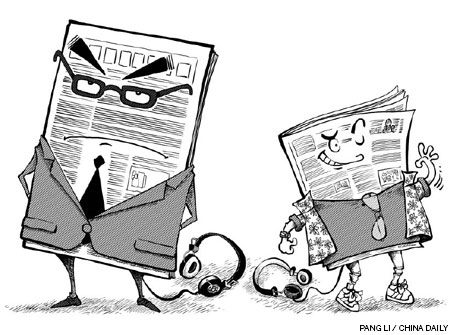
The press barons of the world have been known to make presidents and prime ministers tremble with fear, but now, with revelations of illegal wire-tapping and ethical lapses in the Rupert Murdoch news empire, the tables have turned. The king of tabloid journalism is himself fodder for the kind of humiliating exposure that his hacks excelled at. But a scandal that's left the News of the World dead in its wake and a raft of new rules governing interaction of press, police and politicians is not a victory for free press.
Tabloids are not the problem. Though more esteemed members of the press corps may think themselves to be quite different, they play a similar game. After all, there is a certain glee to be had in taking down a "bad" guy, all the more fun if the object of attention is haughty, arrogant and acts above the law.
Gotcha!
Journalists interview and investigate, police arrest and interrogate; they work in tandem as social watchdogs to uncover wrongdoing. Going after prostitutes and crooks is one thing, taking down white-collar criminals, the presumed social superiors to the "blue-collar" cops and struggling scribes, is a different matter entirely.
It's an uphill battle to play "gotcha" with the political elite because they embody the very status quo power structure that police are hired to uphold. That's where irreverent journalists come in, and that's why journalists are sometimes hushed with money and that's why the likes of Murdoch's minions got away with whatever it was they were doing wrong for so long.
For the tabloid press there's the thrill of the chase, followed by the pay shot or eavesdrop that promises a new angle to a news topic. There's the photograph surreptitiously snapped, or the phone and mail message hacked, the kind of thing that intelligence agencies get away with because they don't share it with the public.
This crude "gotcha" impulse can be seen at its naked best in the tabloids, but broadsheets play a similar game, only they dress it up in fancier clothes, calling it investigative journalism, accountability and advocacy. The New York Times, for example, doesn't print photographs of naked starlets, and it tends to deal politely with United States' allies such as the United Kingdom and Israel, but it takes evident glee in "exposing" the ill-considered deeds of those who dare to challenge American hegemony, whether it involve digging up the latest "dirt" on Iran, Russia or filing yet another hyped up story about a rival's ethnic tensions or pro-American dissent.
Yes, even in the pin-drop silent corridors of power stalked by the stealthy "Gray Lady" known as The New York Times, echoes of "gotcha" journalism resound, even if her ladyship's diction, deportment and dazzling vocabulary serve to sanitize, mesmerize and divert attention from the tabloid spirit bubbling underneath.
Where the tabloid press may try to please its readers, and sell more soapsuds, with a long lens shot of a sun-bathing star, or poke fun at a pompous local politician, The New York Times saves its long shots and low punches for Beijing and other foreign governments. Indeed it is the countries that deviate from the American way (tacitly assumed to be universal) that seem to irritate, annoy and inadvertently puncture the egos of the self-inflated press lords of Manhattan.
Tabloids and broadsheets look superficially different but one need only consider how Murdoch has hitched high and low together in service of his political agenda and family fortune, ranging from The Times, London, to The Sun, from the New York Post to The Wall Street Journal.
The New York Times recently bared its fangs in a case of double leak and double betrayal, printing US State Department cables exposed by WikiLeaks, but without the permission of its chief Julian Assange, who they then went on to castigate and humiliate in numerous formats, the most egregious case being a venomous ambush by the then executive editor, Bill Keller, who inserted snarky asides about Assange's body odor and dirty socks.
Presumably the preppy Keller, whose reputation was stained by his role as liberal cheerleader for the bloody war in Iraq, is an obsessive hand-washer with clean feet.
The world abounds with wrongdoing and miscarriages of justice, but at the tut-tutting non-tabloid tabloids such as The Times, those who dare to challenge their smug worldview are put in the crosshairs.
The tabloids may attack hubris with humilition and revel at making the famous infamous but make no pretense about holding the high moral ground.
In contrast, the elite press can skewer national debate in a way that lends credence to unwarranted war.
The gutter press may tar and feather unlucky celebrities, but the elite press can, with frightening "credibility", tar an entire nation with a single brush.
Yes, tabloids are crass and err from excess, but they also tackle taboo topics that the elite press can only sniff at. The aggressive curiosity and invasive inquisitions that animate the worst of the press also inform the best, for all journalists are in the "gotcha" business in one way or another.
The author is a visiting fellow in the East Asia Program, Cornell University, New York.
(China Daily 07/27/2011 page9)